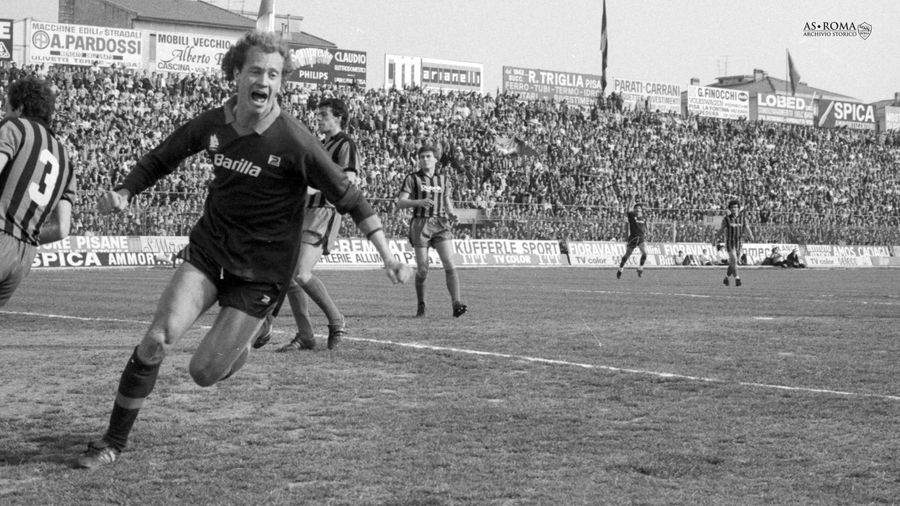
On Paulo Roberto Falcao's birthday, a look back at one of the greatest players in the club's history...
Paulo Roberto Falcao was born on 16 October 1953 - far away from Rome it may have been but, like Amedeo Amdei before him and Francesco Totti after him, he would eventually become known as 'l'ottavo Re di Roma' ('The eighth king of Rome').
But to many fans he was also 'Il Divino' - 'the Divine One' - and that nickname has remained his and his alone ever since.
Here are a few more details about the club's iconic No. 5...
1. The showman
Falcao landed at Fiumicino at 10:35 on 10 August 1980, although he was only formally presented to the fans at the end of the month in a match against his old side, Internacional. He was a playmaker, but perhaps not in the traditional Brazilian style - he had incredible class and composure on the ball, although he wasn't really one for party tricks or mazy dribbling runs.
Nevertheless, prior to that first game the club's president Dino Viola had asked him to produce a few spins and tricks to excite the crowd. "I've come to Roma to win, not to do tricks for the public," Falcao said after the game.
2. Jorge Ben's samba style
How exactly should one pronounce 'Falcao'? It was a question the player himself had to answer often, almost immediately upon landing in the Italian capital.
The Brazilian musician Jorge Ben helped everyone out by coming up with a novelty song that worked through the issue. From "Faucaun" and "Falzon" through to "Falcone"... the final effect was memorable.
3. A sign
On 14 September 1980, a few moments before Falcao made his debut for Roma away to Como, the pitch at the Stadio Sinigaglia was blessed by Don Giovanni Lanfranconi, the priest of the local church.
The benediction, which covered both teams too, was perhaps an omen for the new player who would become known to everyone as 'Divino'.
4. Starting in style
The newspapers Corriere dello Sport, Il Messaggero, Il Tempo and Paese Sera all went wild for Falcao's first appearance for the club - giving him a 7.5 rating in the papers the following day. As good as it got from everyone who played that day.
5. Winning mentality
Falcao’s impact on the side, from a mental perspective too, was clear almost immediately. The Brazilian acknowledged as much himself years later, saying: “Speaking with some of my teammates [that day], I got the sense that they were happy enough to settle for an away draw on the opening day. I made it clear we needed to make sure we won, that we couldn’t ever think like that.”
Coach Nils Liedholm shared that sentiment, at half-time coming in and telling teammates to make sure Falcao got on the ball as much as possible. “He shouldn’t touch it four times, he should touch it 400 or more,” he said. And it worked – Roma winning 1-0 in the end.
6. The 'milk brother'
If Falcao quickly settled into life in Rome, then it was at least in part due to the influence of Pato Moure. The 'fratello di latte' (literally, 'milk brother') of Divino, he was the man who travelled with the player throughout his time in Italy to ensure that the player did not suffer too much from the famous saudade; the general sadness that seemed to affect Brazilians who left the homeland.
Pato worked as a journalist around the Roma environment. Some of his commentary - "Roma quattttroooo, Fiorentina nienteeee", "Roma Gol" - would eventually become somewhat famous in its own right.
7. The best
Earlier this year, Falcao was voted the greatest foreign player in the club's history - beating another Scudetto winner, Gabriel Batistuta, in the final.
Among the players he beat in the head-to-head tournament along the way: Emerson, Kevin Strootman, Toninho Cerezo and Aldair.
8. The first boots
On his sixth birthday, Falcao's father Bento gave him a pair of football boots. But when Christmas arrived and young Paulo Roberto received a toy truck, he told his parents that Father Christmas must have made a mistake: he had specifically asked for a football. His love for the game was already set in stone.
9. A legendary strike
For the longest time, Falcao considered it his best goal ever: "The ball came to me on the edge of the area and, after a few touches where the ball never touched the ground, I lashed it home."
The goal itself came in 1976, in the 90th minute of a game for Internacional against Atletico Mineiro in the semi-finals of the Brazilian top-flight. Not only was it a brilliant goal but it was a decisive one - and Internacional would go on to win the final too.
10. 'Bianco, Rosso e Verdone'
Monica Vitti, Alberto Sordi and... Paulo Roberto Falcao. Those were the unlikely band of faces that Sergio Leone, the grandfather of the spaghetti western, invited to watch an early cut of his cult classic film 'Bianco, Rosso e Verdone'.

 Tickets
Tickets
 Shop
Shop

































